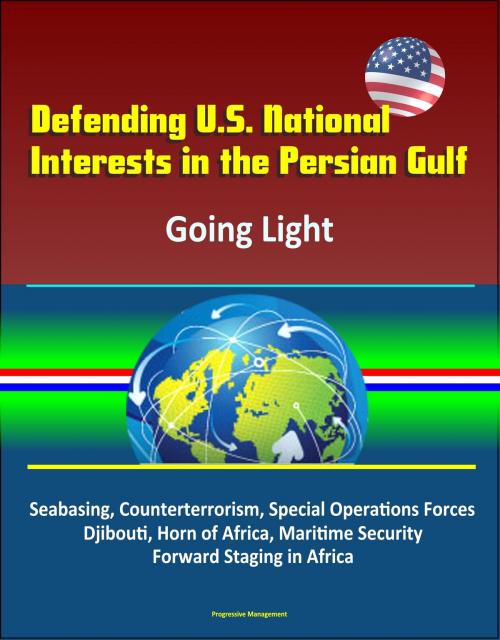Defending U.S. National Interests in the Persian Gulf: Going Light - Seabasing, Counterterrorism, Special Operations Forces, Djibouti, Horn of Africa, Maritime Security, Forward Staging in Africa
Nonfiction, History, Middle East, Military| Author: | Progressive Management | ISBN: | 9781310881626 |
| Publisher: | Progressive Management | Publication: | May 29, 2016 |
| Imprint: | Smashwords Edition | Language: | English |
| Author: | Progressive Management |
| ISBN: | 9781310881626 |
| Publisher: | Progressive Management |
| Publication: | May 29, 2016 |
| Imprint: | Smashwords Edition |
| Language: | English |
Professionally converted for accurate flowing-text e-book format reproduction, this unique book examines two ways that the U.S. might be able to secure its interests in the Gulf using a minimalist approach. The two methods evaluated are using sea bases in the Gulf and land bases in Djibouti in the Horn of Africa as forward staging bases for SOF operations in the Persian Gulf. The study looks at these two options in terms of costs and benefits both fiscally and physically in terms of the impact that these bases would have on the populations in the Gulf. Is it possible to defend U.S. interests in the Persian Gulf through the use of primarily SOF/light forces? How might implementing this type of force structure affect the perception of U.S. involvement in the region and its ability to project power on a scale commensurate with its interests?
CHAPTER I - DEFENDING U.S. INTERESTS IN THE PERSIAN GULF: GOING LIGHT * A. INTRODUCTION * B. LITERATURE REVIEW * C. WHY SOF? * D. FORCES AVAILABLE * 1. Conventional Support for SOF * E. METHODOLOGY * CHAPTER II - DEFINING U.S. INTERESTS IN THE PERSIAN GULF * A. INTRODUCTION * B. ENERGY SECURITY * 1. SOF Missions to Secure Energy Resources * C. WEAPONS OF MASS DESTRUCTION * 1. SOF Role in Counterproliferation of WMDs * D. COUNTERING THE TERRORIST THREAT * 1. SOF and Counterterrorism * E. CONCLUSION * CHAPTER III - OFFSHORE BALANCING * A. WHY SEABASING? * B. THE JOINT INTEGRATING CONCEPT * C. SEABASING OPTIONS * 1. Maritime Prepositioning Force * D. ADVANTAGES * E. DRAWBACKS * F. CONCLUSION * CHAPTER IV - FORWARD STAGING IN AFRICA * A. THE CASE FOR AFRICA * B. WHY DJIBOUTI? * C. ADVANTAGES * D. DRAWBACKS * 1. Capacity * 2. Blackhawk Down * E. CONCLUSION * CHAPTER V - CONCLUSIONS AND POLICY RECOMENDATIONS * A. CONCLUSION * 1. Djibouti * 2. Seabasing * B. POLICY RECOMMENDATIONS * LIST OF REFERENCES * INITIAL DISTRIBUTION LIST
While attempting to maximize its access to resources and promote security the U.S. has in fact created greater instability in the region and greater threats to the security of its interests. Given the current state of affairs in the Persian Gulf and the view that the world has of the United States it is imperative that we find alternative means to pursue our national interests in order to rebuild not only our national image but also our military capabilities. National interests are those things that a given state deems to be essential to the maintenance of its stability or security. The United States has many interests at stake in the Persian Gulf. The three primary ones, based on current policy, are securing unhindered access to energy, deterring the development or acquisition of Weapons of Mass Destruction by states whose stability is questionable to the point where non-state actors or groups unfriendly to the U.S. could possibly gain control of these weapons, and the disruption of terrorist threats to the U.S. directly or to its other regional interests.
Professionally converted for accurate flowing-text e-book format reproduction, this unique book examines two ways that the U.S. might be able to secure its interests in the Gulf using a minimalist approach. The two methods evaluated are using sea bases in the Gulf and land bases in Djibouti in the Horn of Africa as forward staging bases for SOF operations in the Persian Gulf. The study looks at these two options in terms of costs and benefits both fiscally and physically in terms of the impact that these bases would have on the populations in the Gulf. Is it possible to defend U.S. interests in the Persian Gulf through the use of primarily SOF/light forces? How might implementing this type of force structure affect the perception of U.S. involvement in the region and its ability to project power on a scale commensurate with its interests?
CHAPTER I - DEFENDING U.S. INTERESTS IN THE PERSIAN GULF: GOING LIGHT * A. INTRODUCTION * B. LITERATURE REVIEW * C. WHY SOF? * D. FORCES AVAILABLE * 1. Conventional Support for SOF * E. METHODOLOGY * CHAPTER II - DEFINING U.S. INTERESTS IN THE PERSIAN GULF * A. INTRODUCTION * B. ENERGY SECURITY * 1. SOF Missions to Secure Energy Resources * C. WEAPONS OF MASS DESTRUCTION * 1. SOF Role in Counterproliferation of WMDs * D. COUNTERING THE TERRORIST THREAT * 1. SOF and Counterterrorism * E. CONCLUSION * CHAPTER III - OFFSHORE BALANCING * A. WHY SEABASING? * B. THE JOINT INTEGRATING CONCEPT * C. SEABASING OPTIONS * 1. Maritime Prepositioning Force * D. ADVANTAGES * E. DRAWBACKS * F. CONCLUSION * CHAPTER IV - FORWARD STAGING IN AFRICA * A. THE CASE FOR AFRICA * B. WHY DJIBOUTI? * C. ADVANTAGES * D. DRAWBACKS * 1. Capacity * 2. Blackhawk Down * E. CONCLUSION * CHAPTER V - CONCLUSIONS AND POLICY RECOMENDATIONS * A. CONCLUSION * 1. Djibouti * 2. Seabasing * B. POLICY RECOMMENDATIONS * LIST OF REFERENCES * INITIAL DISTRIBUTION LIST
While attempting to maximize its access to resources and promote security the U.S. has in fact created greater instability in the region and greater threats to the security of its interests. Given the current state of affairs in the Persian Gulf and the view that the world has of the United States it is imperative that we find alternative means to pursue our national interests in order to rebuild not only our national image but also our military capabilities. National interests are those things that a given state deems to be essential to the maintenance of its stability or security. The United States has many interests at stake in the Persian Gulf. The three primary ones, based on current policy, are securing unhindered access to energy, deterring the development or acquisition of Weapons of Mass Destruction by states whose stability is questionable to the point where non-state actors or groups unfriendly to the U.S. could possibly gain control of these weapons, and the disruption of terrorist threats to the U.S. directly or to its other regional interests.















